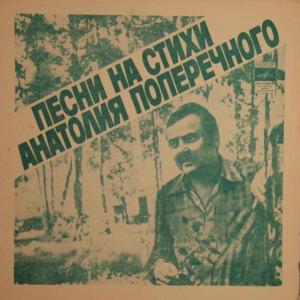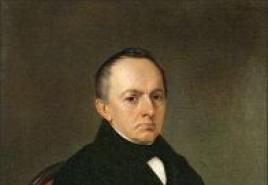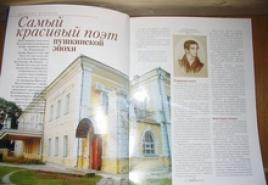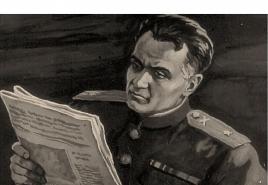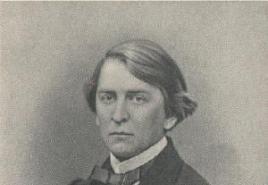“I don’t like your irony ...”: analysis of the poem by N. Nekrasov
In addition to socially oriented poetry, in the soul of N. A. Nekrasov there was always a place for feelings of personal order. He loved and was loved. This was reflected in a group of poems that are commonly called the "Panaev cycle". An example would be the poem "I do not like your irony ...". The analysis will be given below, but for now let's briefly get acquainted with his lyrical heroine.
Avdotya Panaeva
A charming, intelligent woman whom her parents hastily married off because the girl strove for emancipation with all her heart. She imitated aspired to put on men's clothes and - oh, horror! - Painted on a mustache! They married the journalist Ivan Panaev, who was not distinguished by fidelity and did not hamper the freedom of his wife.
A brilliant literary society gathered in their salon, and every single one was in love with the beautiful and clever Avdotya Yakovlevna. But she answered, far from immediately, only to the crazy, crazy feelings of Nikolai Alekseevich, who, not knowing how to swim, drowned himself in front of her eyes in the Fontanka. Thus began a great feeling that lasted about twenty years. But everything comes to an end. And when the feelings began to cool down, Nikolai Alekseevich wrote: "I do not like your irony ...". The analysis of the poem will be carried out according to plan.
History of creation
Presumably, it was written already five years after the beginning of a close relationship in 1850, and published in Sovremennik in 1855. What could serve to cool such violent feelings? After all, A. Ya. Panaeva herself wrote poems about them. Let's try to reflect on the lines of Nikolai Alekseevich "I do not like your irony ...", the analysis of which is part of our task.
Genre of the poem
This is the intimate lyrics of a great civil poet.

The work tells about the feelings that have arisen in the past tense, about their state and the inevitable denouement and the alleged break in the present tense. Apparently, their relationship became habitual and monotonous and did not provide such abundant food for inspiration as civil poetry. Therefore, irony began to appear in the relationship on the part of Avdotya Yakovlevna, which only aggravated the coldness on the part of Nekrasov. This is how the poem “I don’t like your irony ...” appeared, the analysis of which we begin. But the poet must be given his due, he directly and delicately told his chosen one what it was in her behavior that he did not like, hiding nothing.
The theme was the emergence of love, its gradual dying and complete cooling.
The main idea is that love must be carefully cherished, since this feeling is rare and not given to everyone.
Composition
ON THE. Nekrasov divided into three stanzas "I do not like your irony ...". The analysis of the poem, we, of course, will begin with the first.
The lyrical hero addresses directly and simply to a close woman and asks to stop being ironic in conversations with him. Apparently, the sharp-tongued Avdotya Yakovlevna could not restrain herself when something was not to her liking, when she saw in something a disrespectful or inattentive attitude towards herself. According to the lyrical hero, irony should belong only to those who have experienced their inclinations or have never met them. And in both of them, who loved so passionately, there are still tongues of the flame of love, and they warm the soul. It is too early for them to indulge in irony: they must carefully preserve what they have today.
In the second stanza of the poem "I do not like your irony ..." Nekrasov (we are now analyzing) shows the behavior of his beloved woman. She still strives to prolong their dates "shyly and tenderly."

She, very feminine, is still devoted to him in her heart and cannot live without these meetings. And he? He is full of passion. The lyrical hero is still hot and ardent, "jealous dreams" boil rebelliously in him. Therefore, he asks not to be ironic and not to speed up the denouement. All the same, she will inevitably come to them, but let the beautiful relationship last longer.
The third stanza is quite sad. The poet does not hide either from himself or from his beloved that their parting will come soon. Their passions boil more and more. They are full of the last thirst for love, but "there is a secret coldness and longing in the heart." The lyrical hero bitterly states this fact. But you can't hide from him. Therefore, it is not worth ironically to destroy the former beautiful and languishing, tender passion.
Irony, which initially contains mockery, offends the lyrical hero, which is why he says: “I don’t like your irony ...”. An analysis of the poem shows the hidden context of Avdotya Yakovlevna's statements and the direct sincere words of the lyrical hero. He urges his lady of the heart not to demonstrate his negative position with or without reason, but to express sympathy and understanding to him.
Analysis of the verse "I do not like your irony ..."
The poem is written in iambic pentameter, but there are a lot of omissions of stresses (pyrrhic). They convey to the reader the excitement of the poet. For example, the first line in the first stanza begins with pyrrhic, and it ends with pyrrhic, while it is underlined with an exclamation mark.
Each stanza consists of five lines, but the rhymes in each stanza are different. The poet uses ring (first stanza), cross (second stanza), mixed (third). The inner confusion of the lyrical hero is fully manifested in this way.
The poem is built on contrasts. It contrasts cold and hot, boiling and glaciation. Metaphorically, love is compared to a raging river, "but the raging waves are colder ...".

After these final lines there is a meaningful ellipsis. The river seethes, but it will freeze anyway, and the cold binds them both, "who loved passionately." The former relationship, seething with tenderness and passion, is metaphorically opposed to "secret coldness and longing."
Epithets have a negative connotation: the inevitable denouement, jealous anxieties, the last thirst. Others, on the contrary, are colored positively: feelings are "rebelliously" seething, the beloved is waiting for a date "shyly and tenderly."
Epilogue
Nekrasov and Panaeva broke up. Then her husband died, then she lived alone, and after that she happily married and gave birth to a child. However, the poet loved Panaeva and, despite his marriage, dedicated his poems (“Three Elegies”) to her and mentioned in his will.
Writing
The lyrics of N. Nekrasov are largely autobiographical. In a cycle of poems addressed to his wife Avdotya Yakovlevna Panaeva (“I don’t like your irony ...”, “Amazed by an irrevocable loss.”, “Yes, our life flowed rebelliously.”, etc.), the poet truthfully reveals his emotional experiences:
I suffered: I cried and suffered,
In conjectures, the frightened mind wandered,
I was miserable in severe despair ...
The lyrical hero does not soften, does not smooth out his own contradictions and torments, trying to analyze his innermost feelings:
And you and I, who loved so dearly,
Still retaining the rest of the feeling -
It's too early for us to indulge in it!
V love lyrics the hero takes the blame for the onset of cooling, painfully repents of the break in relations, tragically experiencing the suffering of his beloved woman:
Jealous anxieties and dreams
This moral height of feeling, the intense drama of experiences, were a new page in Russian lyrics. Irony, subtle, hidden mockery are concepts alien to true love. And Nekrasov, being "people of high nobility of soul", who appreciates the moral principles of real relationships, does not allow irony in the feelings awakened between a man and a woman. He gives it the status of a sign of the pre-final stage.
Having known victories and disappointments, at the age of thirty-nine, Nekrasov puts mutual understanding and sincerity in one of the first places in relationships. The poet puts these thoughts into the words of his lyrical hero. The latter talks with his beloved, realizing that feelings, the boundaries of which have been violated by irony, are difficult to revive.
And is he trying to do it? The hero wants to convey to his chosen one that people who have the most precious thing in the world - life - should not waste it on empty words that bring only disappointment:
I don't like your irony
Leave her outdated and unlived
And you and I, who sincerely loved,
It's too early for us to indulge in it!
He personifies his feelings with the element of fire, burning with a hot, all-consuming flame, but continues with “ardently loved”, namely “loving”, and not “loving”. This means that there is no longer love between the heroes of the poem, only a “remnant of feeling” remained from it, and everything else was filled with passion, which will also be destined to leave:
While still shy and gentle
Do you want to extend the date?
While still seething in me rebelliously
Jealous anxieties and dreams...
Dreams of overcoming relationships, jealous anxieties of losing them - that's all that fills the hero's heart, but this is not enough for love.
Everyone sees different things under this concept, and I think it would be naive to rely only on one's own point of view. The Bible says that love involves self-sacrifice. But in this situation, there is no question of this, every man for himself. The lyrical hero only thinks about not losing the source of pleasure, and therefore the denouement becomes inevitable:
Do not rush the inevitable denouement!
And without that, she is not far ...
The lyrical hero is well aware that the denouement of relations is inevitable, and nothing can be changed. He does not try to renew the relationship, because his mind knows that, now or later, the outcome is the same:
We boil stronger, full of last thirst,
But in the heart of a secret coldness and longing ...
So in autumn the raging river,
But the raging waves are colder ...
Empty words, the fruits of irony, generated by the absence of true feelings ... They cause melancholy, resentment, one of the most powerful sins is despondency. They, like a litmus test, reveal the true picture of feelings, like a wise fortune teller, they talk about what will happen next.
Fifteen lines told us the story of two people who lost love, confusing a high feeling with passion and clearly seeing the approach of separation.
The poem “I do not like your irony” is part of the “Panaev cycle”. This is Nekrasov's love letter to his beloved woman, with whom at some point he had a big quarrel. Brief analysis“I don’t like your irony” according to the plan can become part of the literature lesson in grade 9 and help the student better understand the poet as a person.
Brief analysis
History of creation- the poem “I do not like your irony” was created in 1850 (presumably), and published only five years later, in 1855 in Sovremennik. A year later (in 1856) Nekrasov included him in his poetry collection.
Theme of the poem- the fading and cooling of feelings as a natural stage in the development of relations between lovers.
Composition- each stanza is part of a description of a sad situation in a relationship, the action develops sequentially.
genre- love lyrics
Poetic size- iambic and pyrrhic, each stanza uses its own rhyme.
Metaphors – “passionately loved”, “jealous anxieties and dreams boil”, “we boil stronger”, “full of the last thirst”, “secret coldness and anguish of the heart”.
epithets – “jealous anxieties”, “inevitable denouement”, “last thirst”, “secret coldness”.
Comparison
History of creation
Nekrasov's relationship with Avdotya Panaeva has never been easy. In fact, the couple lived in a civil marriage with the consent of the woman's husband, the frivolous ladies' man Ivan Panaev. The romance between them began in 1846, and the poem “I don’t like your irony” was written in 1850 - they would be together for another sixteen years, but Nekrasov already had a premonition of the end.
For the first time this poem saw the light in 1855 - it was published in the journal Sovremennik, which the poet owned together with Ivan Panaev. In 1856, Nekrasov published a poetry collection, which included this work.
It fully reflects the essence of the uneven relationship of lovers: despite the mutual feeling, the relationship outside of marriage greatly weighed them down, and the difficult nature of Avdotya became a catalyst for frequent quarrels. Nekrasov describes one of these situations in poetic form - they always sorted out the relationship violently, and temporary cooling of relations happened, but it was this moment that showed the poet that their love would someday end.
Topic
The main theme of the verse is a quarrel between lovers, when their relationship has developed to the stage that feelings gradually begin to fade away, and the once-boiling passion cools down.
At the same time, Nekrasov expresses the idea that only love can give a person a real taste for life, so it must be protected and done especially carefully when the first signs of extinction appear. The lyrical hero expresses this thought, referring to his beloved, who, obviously, made some offensive remark about him.
Composition
The poem consists of three stanzas, each of which expresses its own thought, but all of them are part of a consistently unfolding idea.
So, in the first stanza, the lyrical hero admits that there is no longer the same fire in the mutual feeling, but he believes that this is not a reason to be ironic, because love is still alive, which means that it can be saved.
In the second stanza, this idea develops - both the man and the woman want to be together, but both already understand that the inevitable outcome of their story will be the fading of relations.
The third stanza shows that the lyrical hero has ceased to believe that the relationship can still be extended, he understands that conflicts and scandals are inevitable signs that the cold of a break is already very close.
genre
This work belongs to the genre of intimate lyrics. It is part of what literary critics call the “Panaev cycle”, in which Nekrasov addresses the theme of feelings.
In addition, Nekrasov uses an unusual and innovative technique for his time in the rhythmic pattern of the verse. Despite the fact that the work is written in iambic, it very often breaks into pyrrhic, which makes the rhythm look like the breathing of an excited person - ragged and uneven.
The effect is enhanced by rhyming - the ring stanza is replaced by a cross one, and in the last stanza the cross one is mixed with an adjacent one. Such disorder fully reflects the inner rebellion of the lyrical hero.
means of expression
In order to convey the feelings of the lyrical hero, the poet uses a variety of expressive means:
- Metaphors- “those who loved ardently”, “jealous anxieties and dreams boil”, “we boil stronger”, “are full of last thirst”, “secret coldness and anguish of the heart”.
- epithets- “jealous anxiety”, “inevitable denouement”, “last thirst”, “secret coldness”.
- Comparison- feelings before parting are like an autumn river: the most turbulent waters flow before it freezes.
Poem Test
Analysis Rating
Average rating: 4.2. Total ratings received: 21.
Poem by N.A. Nekrasov “I don’t like your irony ...” refers to the so-called Panaev cycle, whose poems are inspired by relationships with V. Ya Panaeva and form a single lyrical diary that reflects all the shades of feelings of the lyrical hero.
The poem belongs to love lyrics and reflects the moment of a person’s inner life, his experiences, therefore there is no detailed description of events that have a beginning and horses, a complex interaction of characters, plot motivation, therefore the poem begins without any “overture”:
I don't like your irony
Leave her obsolete and not alive
And you and I, who loved so dearly,
Still the rest of the feeling preserved -
While still shy and gentle
Do you want to extend the date?
While still seething in me rebelliously
Jealous worries and dreams -
Don't rush the inevitable denouement.
The second stanza is very emotional. This is facilitated by anaphora. The repetition of the word “bye” at the beginning of two lines receives a significant emotional load and enhances the parallelism of the structure of each sentence and its expressiveness.
In the last stanza - the climax - the lyrical hero evaluates the relationship with the woman he loves as a fading "boiling" dictated only by "the last thirst", but in fact, "secret coldness and longing" in the heart ... "
So in autumn the river is more turbulent,
But the raging waves are colder ...
The poem "I do not like your irony ..." truthfully and accurately conveys a complex process mental life hence the tense drama of the lyrical confession.
We, the readers, know Nekrasov more as a singer of people's suffering, as a poet who dedicated the "lyre" to "his people." In the analyzed poem, he appears in a completely different perspective, very unexpected, and this once again confirms that Nekrasov's poetry is tightly connected with the classical tradition, and, according to the literary critic V.V. Zhdanov, she "inherited Pushkin's clarity of expression of thought, and sometimes even Pushkin's style."
Nekrasov's poetry is distinguished by the desire to ennoble the soul and revive a good beginning in the soul of every reader. This desire was most clearly reflected in the poet's lyrics dedicated to true friends and beloved women.
In 1842, the poet Nekrasov met Avdotya Panaeva, the wife of the poet's friend, writer Ivan Panaev, with whom he revived the Sovremennik magazine. The first meeting between Avdotya and Nikolai took place in her house, where literary figures often gathered in the evenings.
The poet fell in love with a woman at first sight: he was struck not only by her attractive appearance, but also by her special achievements in journalism. Panaeva accepted signs of attention from Nekrasov and a stormy romance began. And since 1847, Avdotya, her husband and Nekrasov began to live under the same roof. Ivan himself agreed that his friend was the common-law husband of his lawful wife and lived with them in the same house. So Ivan wanted to save the marriage, believing that this relationship would not last long. However, Panaev turned out to be wrong in this: Nekrasov's romance with Avdotya lasted almost twenty years. But the relationship between the lovers was not smooth, they often cursed. As a result, the novel did not end with a legal union. The break in relations occurred after the death of a child born to Avdotya from a poet.
In 1850, Nekrasov realized that it was impossible to return the ardor of past relationships. As a result of a long painful novel for everyone, he writes the poem "I do not like your irony." In it, the poet noted that he had previously tortured amazing feelings for one woman. The passion for her was also intensified by the certainty that his chosen one loved the poet just as much. But time is ready not only to create, but also to destroy. It can destroy love.
Nekrasov believes that this happened after the death of their common child. It seems that the death of the baby broke the invisible thread between the lovers, and they began to move away from each other. But the poet understands that love still has not completely died out, but everything around says that separation is inevitably on the threshold. The hero asks his chosen one only to hurry this minute. He does not like the irony of his beloved, because she says better than any confession that the novel will soon come to an end.
This poem is built on contrasts. The image of love is created using a metaphor that compares feelings with a boiling stream. Indeed, in reality, the relationship between Panaeva and Nekrasov flared up sharply, seethed and, having exhausted itself, cooled down, as if all the water had poured out of a boiling vessel, and it was empty.
The poem has a logical conclusion even without a short ending, before which the author put an ellipsis. The comparison of love with the river is the last proof that the poet brought to try to reach an understanding of the chosen one.
An important role is played here by epithets, such as, for example, "jealous anxieties." Each of them has a negative rating. In contrast, they are given positive epithets, such as, for example, “you tenderly wish.” Such a neighborhood hints at the constant mood swings of a couple in love.
Nekrasov sees the actions of a man and a woman as an active manifestation of love, but the poet considers the state of mind described by the words “anxiety”, “thirst” to be without the desired feeling.
It is worth paying attention to the unusual rhythm and rhyme. The poem is written in iambic pentameter. However, there are so many pyrrhic here that the rhythm is lost, as if an overly worried man is out of breath. This feeling is reinforced by the short final line at the beginning.
Nekrasov is a master of words. In just fifteen lines, he managed to tell the reader the love story of two people who lost it, confusing a high feeling with base passions.



